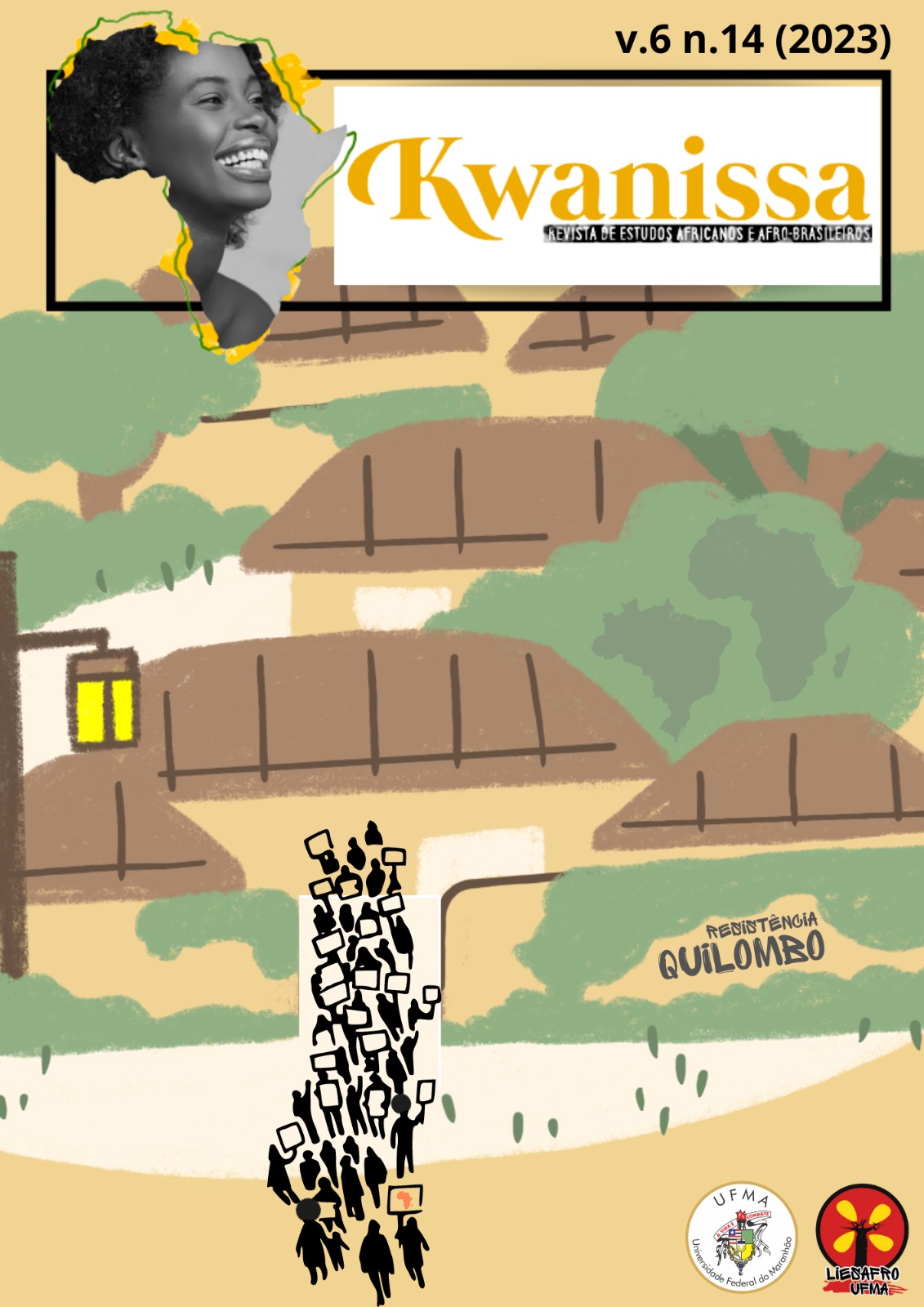MEMÓRIA, RACISMO E POLÍTICA
Uma análise de 1912, Voces para un silencio, de Gloria Rolando, 2010-2013
DOI:
https://doi.org/10.18764/2595-1033v6n14.2023.5Palavras-chave:
Documentário, representação fílmica, Cuba, racismo, memóriaResumo
Temos como objetivo de conferir as representações fílmicas sobre um episódio ocorrido em Cuba a princípios do século XX, que foi a perseguição, prisão e matança, a cargo do governo de José Miguel Gómez (Partido Liberal), de membros do Partido Independiente de Color, organização que pretendia combater o racismo nas diferentes esferas institucionais do país. O tema foi analisado na série em três documentários, com cerca de uma hora cada, intitulada 1912, Voces para un silencio, dirigida por Gloria Rolando entre 2010 e 2013, no contexto do centenário da repressão. A análise fílmica da série será realizada dentro do campo dos estudos entre Cinema e História, e terá por finalidade conferir três dimensões da obra. A primeira será sobre os documentos e discursos mobilizados, que conjugam documentos institucionais, fotografias, canções, páginas de jornais e charges. A segunda discutirá a seleção de protagonistas, em especial historiadores/as e as mulheres negras do século passado e presente. A terceira estará centrada nos temas raciais discutidos em diferentes momentos históricos do passado cubano apresentados na trilogia. Nossa hipótese é de que a obra busca legitimar o tema do racismo na ilha na historiografia nacional, com o apoio das vozes denunciadoras do passado descortinado. Como base teórica, dialogaremos com distintos/as pensadores/as como Jacques Rancière, Michael Pollack, Michel-Rolph Trouillot, Hayden White, Aline Helg e Alejandro de la Fuente.
Downloads
Referências
LAS RAÍCES de mi corazón. Direção: Gloria Rolando. Produção de Imágenes del Caribe. Havana: s/distr., 2001.
, Voces para un silencio. Direção: Gloria Rolando. Produção de Imágenes del Caribe. Havana: s/distr., 2010, 2011 e 2013.
Bibliografia
A. TORRES-ELERS, Damaris. Santiagueras en el alzamiento de 1912: ¿leyenda o realidad? Santiago, Santiago, n. 133, p. 116-128, ene./abr. 2014.
BACZKÓ, Bronislaw. A imaginação social. In: R. Romano (Org.). Enciclopédia Einaudi vol. 5. Lisboa: Imprensa Nacional – Casa da Moeda, p. 296-332.
CASTRO, Sílvio. La Masacre de dos Independientes de Color (La Guerra de 1912 en Cuba). Capítulo de livro. 2012. Disponível em: https://www.afro-cubaweb.com/history/librosilviocastro.pdf. Acesso em: 13 nov. 2022.
DE LA FUENTE, Alejandro. «Tengo una raza oscura y discriminada» El movimiento afro-cubano: hacia un programa consensuado. Nueva Sociedad, n. 242, nov./dic. de 2012.
______________. Los pasados de este presente: La polémica en torno al Partido Independiente de Color. Cuban Studies, Vol. 43, p. 141-148, 2015.
GONZÁLEZ LÓPEZ, David. Relaciones Cuba-África: marco para un bojeo bibliográfico. Estudos Afro-Asiáticos, Rio de Janeiro. Ano 24, n. 3, p. 601-630, 2002.
HELG, Aline. La masacre de los Independientes de Color em la historiografía cubana (1912-2012). Boletín, Acerca del centenario de la masacre de los Independientes de Color em Cuba, n. 74, p. 37-43, 2012.
______. Os afro-cubanos, protagonistas silenciados da história cubana. Revista de Estudos & Pesquisas sobre as Américas, v. 8, n. 1, p. 29-51, 2014.
LUIS, William; ROLANDO, Glora. "Los Independientes de Color": Entrevista a Gloria Rolando. Afro-Hispanic Review, vol. 33, n. 1, p. 273-286, spring 2014.
FERNÁNDEZ ROBAINA, Tomás. Hacia el centenario de la fundación del Partido Independiente de Color: Aproximación crítica a tres nuevas contribuciones, La masacre de los Independientes de Color en 1912 by Silvio Castro Fernández; Una vuelta necesaria a mayo de 1912: El alzamiento de los Independientes de Color by María de los Ángeles Meriño Fuentes; Guantánamo en el vórtice de los Independientes de Color by Ricardo ReyRiquenes Herrera. Caribbean Studies, Vol. 36, n. 1, p. 131-140, jan./jun. 2008.
OLIVA, Elena. “Queremos nuestra emancipación y la conseguiremos”: mujeres en la prensa negra/afro de Cuba y Uruguay durante la primera mitad del siglo XX. PerspectivasAfro, n. 1/1 p. 65-84, 2021.
POLLACK, Michael. Memória, esquecimento, silêncio. Tradução: Dora Rocha Flaksman. Estudos Históricos, Rio de Janeiro, vol. 2, n. 3, p. 03-15, 1989.
RAMOS, Júlio. Um cinema afro-cubano? Conversa com Gloria Rolando. In: Revista Contracampo, Niterói, v. 27, n. 2, p. 34-48, ago./nov. 2013.
RANCIÈRE, Jacques. A ficção documental. Tradução: Analu Cunha. Arte & Ensaios, Revista do PPGAV/EBA/UFRJ, Rio de Janeiro, n. 21, p. 178-189, dez. 2010 [1999].
RODRÍGUEZ OCHOA, Yoel. La historiografía cubana sobre los Independientes de Color: una mirada a cien años de la masacre. Revista Caribeña de Ciencias Sociales, p. 01-13, nov. 2012.
ROMAY GUERRA, Zuleica. De afro-cubanos a cubanos negros. Revista Brasileira de Estudos Africanos, Porto Alegre, v. 3, n. 6, p. 77-91, jul./dez. 2018.
SANTAMARÍA GARCÍA, Antonio. «María de los Ángeles Meriño Fuentes, Una vuelta necesaria a mayo de 1912, La Habana, Editorial de Ciencias Sociales (colección Pinos Nuevos), 2007, 157 p., mapas, índice general y bibliografía» . Resenhas e ensaios historiográficos. Nuevo Mundo Mundos Nuevos [Online], 06 out. 2009. Disponível em: https://journals.openedition.org/nuevomundo/57269 . Acesso em: 13 nov. 2022.
SANTOS, Giselle. A representação da mulher negra na literatura cubana. In: PINTO-COELHO, Zara; MARTINS, Moisés de Lemos; BAPTISTA, Maria Manuel; MAIA, Sara (org.). Representações e prática de género. Braga: CECS Edição impressa e eletrónica, 2015, p. 13-32. Disponível em: http://www.lasics.uminho.pt/ojs../index.php/cecs_ebooks/article/view/2127/0. Acesso em: 14 nov. 2022.
SOUZA, Bárbara Oliveira. A ambígua condição negra em Cuba: relações raciais e mobilizações coletivas antirracistas. 377 f. 2015. Tese (doutorado em Antropologia Social) – Instituto de Ciências Sociais, Universidade de Brasília, Brasília, 2015.
TROUILLOT, Michel-Rolph. Silenciando o passado: poder e a produção da história. Tradução: Sebastião Nascimento. Curitiba: huya, 2016.
WHITE, Hayden. O passado prático. Tradução: Arthur Lima Avila, Mario Marcello Neto, Felipe Radünz Krüger. ArtCultura, Uberlândia, v. 20, n. 37, p. 09-19, jul./dez. 2018 [2010].
ZURBANO TORRES, Roberto. 1912. Voces para un silencio: un grito de alerta para el siglo XXI. Texto mimeografado. New London, 2012. Disponível em: https://www.afro-cubaweb.com/grito-de-alerta.pdf. Acesso em: 12 nov. 2022.
Downloads
Publicado
Como Citar
Edição
Seção
Licença

Este trabalho está licenciado sob uma licença Creative Commons Attribution-NonCommercial 4.0 International License.
Direitos autorais Kwanissa: Revista de Estudos Africanos e Afro-Brasileiros
Este obra está licenciado com uma Licença Creative Commons Atribuição-NãoComercial-SemDerivações 4.0 Internacional.











